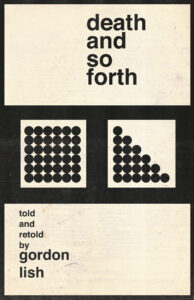
[Dzanc; 2021]
Gordon Lish is trying to explain himself. This second sentence should be a brief introduction to what this book is, but it is immediately difficult to know considering what I suppose would be its most complete title: Death and So Forth: A Tisket of Twenty Scriptions Told and Retold by Gordon Lish. Immediately, there are some questions, like, What is a tisket? (A tasket!) What is a scription? And, as ever, who is Gordon Lish?
I’m only being a little cute. Gordon Lish has put a lot of effort into eschewing the words that we generally use to describe books — not just rejecting those words for nothing, but offering new words. Recent subtitles include “A Spokening” and “In Thirteen Sittings,” and then there is his Collected Fictions, which is not quite the same thing as saying Collected Stories. So, while there is a way to read this book as a “Selected and New Stories,” it doesn’t feel in good faith. If Lish isn’t calling them stories then I won’t, and anyway I’m in agreement that “story” is a terribly overused word. What I think we’re doing — what I’m inferring, by “tisket” and “scription” and “death” — is that we’re playing a kind of textual game with Gordon Lish, a game that is still with its dedications, which might be to say obsessions, which are obviously threnodic. As Lish writes upfront, “Whether you are a writer or a reader or, not unlikely, both, have some fun while you’re at it — until you can’t.”
But, alright, if we’re playing a game I should bring some words too, and if we’re supposed to have some obsessive fun I’m going to pick this one: Account. This is, as I’ll use it, a kind of philosophical word. But there is no way to read Gordon Lish without coming face-to-face with your own philosophies and assumptions, conscious or no, about what writing can and cannot do. This may be, in fact, the reason we are still reading him (if we are). That’s not to say this confrontation isn’t maddening, or annoying, or otherwise tiring. But it is, nonetheless.
“Account” may also help me answer that pesky question: Who is, as writ, “aulde Gordo”? Biographically, in actuality, to use a recurring phrase of Lish’s: let’s skip it. That DeLillo blurb about him being famous for all the wrong reasons is good enough, if overused — but Lish’s biography is itself overused. Lish goes over it in four typed lines in the first scription, writing, “Especially when you might not be unaware of the putative writer-in-charge having spent years as an undisputed editor-in-charge, as Genesis West, Esquire, Alfred A. Knopf, The Quarterly — plus, ugh, in the classroom and, ugh, as a teacher.” Of course, I doubt that we are unaware, but anyway what immediately follows is more interesting:
You see, the thing all of a sudden is that I, Gordo, have begun to discover myself at a scary and scarier distance from my feeling much sure-footed anymore, right up, for instance, to the instant ago when I started to stumble into a worry pit beset with wonderment: as per, hold it, um, that bit supposed to fit the situation, is it anymore or any more?
Are you buying this?
Buy it.
I’m making an admission.
I like “admission” too. But here also is what I like about “account”: In Judith Butler’s Giving an Account of Oneself, this very word and whatever it means to somehow give one, or to “explain oneself,” is gone over, painfully and painstakingly, for how difficult if not impossible the demand is to satisfy. But this is exactly why the term is useful: it is similarly unsure-footed. Like “scription” it forces us to reconsider accepted terms, to find out what we mean when we use a word like “story.”
Butler’s question is: “In what does that ‘I’ consist?” Especially when — and Butler actually uses the word “story” here but let’s not — “I begin my [scription] of myself only in the face of a ‘you’ who asks me to give an account.” That relation is of primary concern for Butler, who views it as actually constitutive of the “I”; that “the ‘I’ has no [scription] of its own that is not also the [scription] of a relation.”
This relation, between the “I” who gives an account and the “You” who receives it — between writer and reader, let’s say — is also Lish’s primary concern. “No, no, my friend,” he writes, “this is an honest man’s preparation for confession, his implorement for your conceding, or, anyhow, entertaining the charity of an apportioned concession. A pleading, that’s what I’m making.” That Butler’s concern is driven by a particular poststructuralist mode of thought is probably only more relevant, as that is Lish’s fondness: “Tale of a Horse” calls out to the Roland Barthes of Camera Lucida, and Lish’s “spokening” in Cess makes repeated use of Louis Althusser’s theory of interpellation. It’s a theory whose utmost concern is language: by whom it is wielded and on whom it is used. Which is to say, Lish knows exactly what he’s doing when he is “pleading,” or when he writes about apostrophe as “the affect of address to,” or when he writes in “Mr. Goldbaum,”
It is not necessary for you to lend yourself to any further effort to create particularities that I myself was not competent to render.
Except it would be a tremendous help . . .
This is a collaboration. Maybe even a kind of discussion. At least one of these scriptions is a Platonic dialogue (concerning window shades). The Gordon Lish of these scriptions, this “I, Gordon,” is dependent upon dialogue to sustain him — dialogue with us, the reader. We are, to Gordon, a “tremendous help.” We may even be the precondition of his existence. When Butler writes that “I exist in an important sense for you, and by virtue of you,” it may be the literal sense that “I, Gordon” doesn’t exist without us reading him. Like if a tree in a forest [gives an account of itself], and no one is around to hear it. When this “I, Gordon,” (by whom I do not mean the actually living and breathing Gordon Lish, by the way) interrupts himself to ask us, over and over, “You know what I’m saying?” or “Was that too much?” he is calling us specifically into the what Butler calls “the emotionally laden scene of address.” That scene, where the “I” is put down on paper and, for Butler, is “called upon, and calling,” is also “the scene of not knowing, of being overwhelmed, [which] also, in the present, sustain[s] me.” So when Gordon asks us “Was that too much?” there is a communication there of that overwhelming and of being overwhelmed and, maybe, also an invitation for us to write in the margins: “Yes.” Because our reading of a book is the only thing that sustains its account, by continuing to turn its pages.
A question that might be arising about here is: Fine, Gordon is giving an account of himself, so the question is not anymore, What is an account?, but, What is the account? Not “How” but “What” is Gordon telling us? When he writes,
Listen, I implore you for you to just to please for just this once this one more time to please for you to please for the mercy of God to please be so good as to maybe really this one last time please actually really and truly listen.
What are we hearing? (Besides, hilariously, Gilbert and Sullivan, in this quoted instance in “Coup de Theatre” which follows, “Farewell, my own, light of my life, farewell — for crimes unknown I go to my dungeon cell.”)
This is a perfectly understandable question and, let me be honest with you (“you”), I’ve been avoiding it. Because, and maybe this is funny, maybe you’ll laugh: I don’t know. This could be the classic problem of form over function, if we can actually claim that fiction has any function in the world (and maybe this is part of the point: that fiction is completely useless, futile, in vain) — Lish’s fictions have always felt driven by form rather than to it. Walking away from Death and So Forth, the most memorable thing will be the language: its rhythms, recursions, its playfulness. It is, perhaps, language for language’s sake — which would be unsurprising for a man who once wrote a grammar textbook. Gordon’s “admission” may only be that he is entirely unrepentant. There will be no apologies for his cuts to Raymond Carver in these pages, no sir.
But, at the same time, if we have, as Butler’s theory suggests, asked Lish for an account of himself, there might be another way to phrase the question: What are we asking for?
Because at this point, Lish is nearing ninety. He is the author of, like, twenty-something books, editor of countless others, and, as mentioned, his biographical importance and infamy is generally too well known by those who have any cause to know his name in the first place. We should probably know what we’re getting at this point: old dog, old tricks. In this way, I might feel bad for anyone picking up Death and So Forth as their very first encounter with Gordon Lish — except I know that if I did the same, if I didn’t have any of the baggage of Lish’s biography, I’d probably be absolutely thrilled. Because these might be old tricks (for Lish), but they are still good tricks: the sentences in this book are excruciatingly delightful; the obsessions in this book, with death and with language, are worthy obsessions; and the self-stylizing autofiction on display here is still exciting, especially in one of the final scriptions (“Watch Out!”) which is immediate and urgent enough to display Gordon’s life in the pandemic, while trying to write the very book we are holding, addressing his own history and the book’s own publisher:
and so now I, Gordo, am seated here to play ball with the phantoms in charge, MAKE AMENDS, get the word out to the Dzanc people that I had had it, that it’s too perilous, ipso facto and words to this effect
It’s fun. You know, if it’s what you’re into.
Which isn’t to say Death is empty; it is, in fact, quite full of itself. It is more than a phantomic obsession; there is a very real grief in these pages, constant and overwhelming. The Gordon of Death and So Forth is a haunted man: we haunt him as his readers; his late wife Barbara haunts him through many of these stories; his parents haunt him, long dead; and so many of his friends, with tribute-scriptions here for Ken Kesey, Harold Bloom, and Denis Johnson, among others. Gordon has watched a lot of the people closest to him die, or otherwise leave.
This grief can even catch us off guard. As grief often does. “Does This Mean Anythugng?” is a scription told in typos, the constant mistakes banged out on Gordon’s old Underwood typewriter, which I was immediately annoyed by — what a gimmick! ugh! — but then found myself surprisingly affected when I reached the end with its “Trembl,ing. Does tbis means anythungb.” and “Sorrgreu fr wastbg yojur tne. Xkrrg Zkrrgr. Am so ashamedcx.”
It’s sad! It’s almost annoyingly sad, it’s a sadsack book — it feels soundtracked by Johnny Cash’s cover of “Hurt” — and yet here I am, sad also, brought into the sadness of this account, perhaps precisely because I came into it with certain expectations, guarding myself against certain linguistic predilections, preparing to play the game, but walked actually into a fucking funeral. I miss everyone who’s ever died. Butler writes, “Something is being done with language when the account that I give begins: it is invariably interlocutory, ghosted, laden, persuasive, and tactical.” This Gordon, in this book, might be the perfect example of each one of those adjectives, all simultaneously.
This is why I may not mind the failures, the indulgences, the repetitions, the annoyances. Butler writes anyway that “any effort ‘to give an account of oneself’ will have to fail in order to approach being true.” One has to give a lot to Death and So Forth to get anything out of it — a lot of forgiveness has to be pre-emptively extended, and that is almost definitely not an equal exchange even if the question of who is giving more is perspectival — but there is something to be got out of this book. Probably.
“What we might call the truth of the person,” Butler writes, “might well become more clear in moments of interruption, stoppage, open-endedness.” This is what I will think about when I think about Death and So Forth, when Gordon writes: “You can lose the thread, you know. You can lose it even if it’s your own textile you’re weaving.” Indeed, there’s quite a lot to lose.
Kyle Francis Williams is a writer living in Brooklyn. He is an MFA Candidate at UT Austin’s Michener Center, Interviews Editor for Full Stop, Director of Communications for Chicago Review of Books, and A Public Space’s 2019 Emerging Writer Fellow. He is on Twitter @kylefwill.
This post may contain affiliate links.







